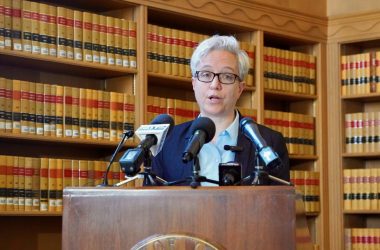If you or someone you know who works in agriculture, forestry or the fishing industry is struggling, call or text 833-897-2474 for help.
When Oregon farmers, farmworkers or ranchers sink into an emotional crisis or simply need someone to talk to, they now have counselors available.
A new hotline, the Agristress Helpline, launched in Oregon in September. It is tailored to support those who work in agriculture, forestry or the fishing industry through a phone and text service that operates 24 hours a day, seven days a week. The helpline is free and has trained counselors with experience in those industries who can take phone calls in 160 languages, with English, Spanish and Vietnamese professionals available to respond by text.
Its launch marks a dream come true for Allison Myers, who leads the Family and Community Health program at the Oregon State University extension service and campaigned for months to get the line established in Oregon.
“I’m honored to be a part of it,” Myers said. “It’s been a big team effort.”
Besides Myers, the line has the backing of nearly 30 farm and health care organizations, Todd Nash, president of the Oregon Cattlemen’s Association, and Sen. Bill Hansell, R-Athena. Hansell championed a bill approved by the Legislature in the final days of this year’s session that allocated $300,000 for the line. That money went to the Oregon State University Foundation, which has set up a helpline endowment that’s expected to produce $12,000 a year in interest. That’s not enough to pay for operations, which cost about $70,000 a year.
The state was able to launch the service – which also operates in Connecticut, Missouri, Pennsylvania, Texas, Virginia, and Wyoming – thanks to donations totalling nearly $70,000 from Eastern Oregon Coordinated Care Organization, which serves rural Medicaid recipients in eastern Oregon, and the Roundhouse Foundation, a philanthropic organization based in Sisters.
To keep the line going in perpetuity, the endowment needs to increase to about $1.75 million, Myers said.
“Obviously, we still have more fundraising to do,” Myers said.
As a start, she’s working to inform people in various communities and in rural areas about the service.
“Our goal is to spread the word,” she said. “Our next steps involve preparing and disseminating marketing materials for the line, through extension offices statewide and also through partners.”
Experts say the line is sorely needed. Although the 988 crisis line provides a similar service, the Agristress line is specialized to address the needs of farmers, ranchers, loggers and fishermen. They often work in social and geographic isolation and in areas with limited access to health care services. These professions also have to grapple with extreme weather conditions, such as flash flooding or drought, and they face fluctuating commodity prices.
And they come from a culture of self-sufficiency, which means they might be reluctant to tell someone they need help. That stoicism can have dire consequences: They have the highest rate of suicide among all professions in Oregon. More than 70 took their own lives between 2016 and 2020, a rate of 104 people per 100,000. That compares with 21 per 100,000 on average in Oregon in 2020.
The service says calls are answered within 30 seconds, and all callers are screened for suicidality, with intervention for those at immediate risk. Others are offered relevant resources, and everyone gets a call back within 24 hours. Counselors are trained in mental health issues related to agriculture and the other professions, including production and financial issues, market fluctuations and family dynamics.
It’s unclear whether the line is being used much or having an impact. The service is secretive about its use and has not released any data about use of the line.
“We are evaluating the service carefully and will share findings when we have them,” Myers said.
Oregon Capital Chronicle is part of States Newsroom, a network of news bureaus supported by grants and a coalition of donors as a 501c(3) public charity. Oregon Capital Chronicle maintains editorial independence. Contact [email protected]. Follow Oregon Capital Chronicle on Facebook and Twitter.




